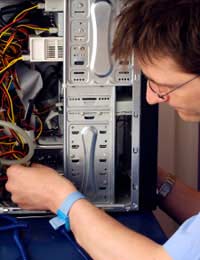Upgrading Your Computer

Just like a new car, as soon as you take that shiny computer out of the shop it begins to lose its value. But, unlike a vehicle, in six months it can be completely out of date, given the advances in technology these days. Obviously, you don’t want or need to be buying a new computer every year – that’s quite a serious investment.
Really, as long as the computer does what you need, there’s absolutely no reason to replace it at all. What you can do, however, is upgrade it. That’s a lot cheaper for you, and even if it doesn’t perhaps offer all the bells and whistles that come with a new machine, you’ll find it will lengthen the life of your computer.
Increasing Your Computer’s RAM
You’ll almost certainly have come across the term RAM, or Random Access Memory. The computer you buy will be fitted with so much, probably 256k or 512k in more recent machines. By increasing the amount of RAM in your computer you can speed up the performance, because then, when you’re performing tasks, the machine doesn’t have to briefly write data to the hard drive to complete the job.Depending on the type of RAM you have, it’s actually quite easy to increase the RAM yourself, and you can find several instructional sites and videos online.
Most people, however, would probably rather entrust the job to the professional in the local computer repair shop, and even then it’s not expensive, in all likelihood no more than £60, and you’ll notice the difference as soon as you begin working – it’s like having that magical something added to your car that boosts speed and performance. It’s the simplest and probably most effective upgrade you can make to your computer.
Upgrading Your Hard Drive
Computers come with larger and larger hard drives these days, but they’re necessary as we deal with bigger and bigger chunks of data. You might well find that you’re nearing the capacity of your hard drive, especially if it’s 60 gigabytes or less. But that doesn’t mean you need a new computer; simply put in a new hard drive.There are two ways to do this. You can add an additional hard drive, which is actually the simplest method and not at all intrusive. But if do you opt for completely replacing your hard drive (and one data recovery specialist has said that the average life of a hard drive is three years), then it can be a mammoth task. First you’ll have to transfer all the files on your computer onto the new hard drive.
After that you’ll need to re-install your computers operating system (OS) from those discs you have somewhere, after which you’ll need to put on all the software you had before. In other words, it’s an upgrade not to be approached lightly.
Other Upgrades For Your Computer
If you computer just has a CD-ROM drive, you might consider moving to a DVD-ROM drive, which is faster and will also let you play DVDs. A DVD-RW drive will let you burn DVDs, which can be useful to people.Similarly, if your graphics card is old, buying a new one can make for a very effective upgrade, although the first thing to check (and if you don’t know, take your computer to a repair shop and ask) is what newer graphics cards will work with your computer’s motherboard.
However, if you just decide to do one thing to upgrade your computer, go for increasing RAM, as much as the machine will handle; it’s where you’ll notice the biggest difference.


Re: Has Email Replaced Letter Writing?
i love the points on here!
Re: What are the Negative Effects of Video Games on Society?
I visited multiple sites however the audio quality for audio songs present at this website is…
Re: How a Young Generation Accepts Technology
Hi there! Would it be possible to get an email address I could send a copyright request to? The Educational…
Re: How a Young Generation Accepts Technology
Young generation accept technology happily because they do every thing eg.shopping online
Re: How Video Games Became Major Entertainment
hi i'm doing a passtion project for school on video games became major entertainment and the question i'm trying…
Re: Has Online Shopping Made Life Easier?
Nowadays, buying on the internet has become even easier than ever, because of platforms that help you to pay such as…
Re: How a Young Generation Accepts Technology
who else is researching this for school?
Re: How a Young Generation Accepts Technology
like what majusa93 said, "Hello, I was wondering if you could tell me something about the author of this…
Re: Has Online Shopping Made Life Easier?
I like online shopping since it has things shops might not always have in stock
Re: How a Young Generation Accepts Technology
Hello, I was wondering if you could tell me something about the author of this article, how is he connected to…